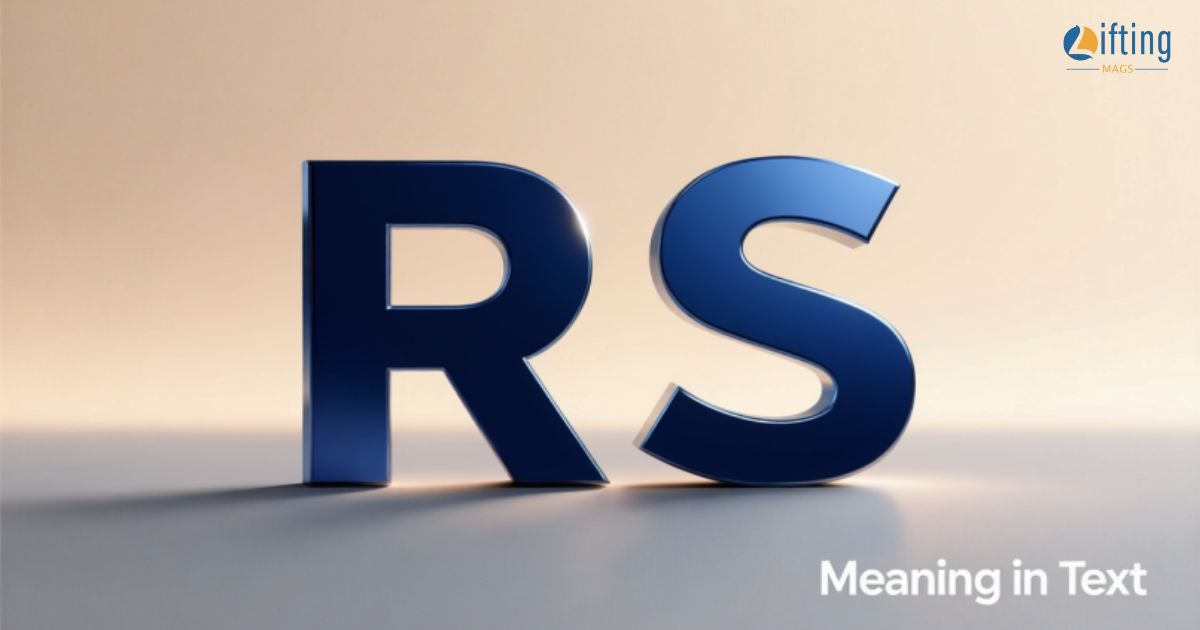Short answer: RS is a tiny abbreviation with big context. Depending on tone, platform, and relationship, RS can mean Reply Soon, Respectfully, Reschedule, or Real Soon. This guide explains each meaning, shows how to read RS in context, gives polite/professional/casual alternatives, and supplies practical examples so you never misread (or misuse) it again.
Introduction: Why a two-letter shorthand matters in 2025
Language is getting leaner. You send short messages on mobile devices, and readers scan—so small signs like RS carry out-sized meaning. Understanding those signs keeps your messages clear and your relationships smooth.
In this guide you’ll get clear definitions, decision tools, alternative phrases by tone, and real-world examples. By the end you’ll know when RS helps you communicate and when it could confuse the person on the other end.
What Does “RS” Stand For in Text? (Quick overview)
RS is not a single fixed term — it’s a context-driven abbreviation. In quick chats it often asks for a reply; in workplace threads it can signal respect; in scheduling it can mean reschedule; and among friends it can mean something’s happening “real soon.”
Below is a concise table to bookmark:
| RS meaning | Typical platforms | Tone | Quick use |
|---|---|---|---|
| Reply Soon | WhatsApp, SMS, DMs | Polite, lightly urgent | Prompt a reply without pressure |
| Respectfully | Email, Slack, business chats | Formal, courteous | Sign-off or tone softener |
| Reschedule | Calendar invites, team chat | Neutral, business-like | Propose changing time/date |
| Real Soon | Social media, group chats | Casual, friendly | Indicate imminent action |
1. RS = Reply Soon (what it signals)
RS = Reply Soon is the most common texting usage; it’s a short, polite nudge that says “please get back to me when you can.” Use it when time matters but you want to remain courteous.
2. RS = Respectfully (how professionals use it)
RS = Respectfully appears mostly in formal or semi-formal messages to soften tone or close an email with courtesy. It communicates deference without being passive.
3. RS = Reschedule (scheduling shorthand)
RS = Reschedule is used when meetings or calls need to move. It’s efficient but risky if calendar details aren’t present—always follow with the new time or a confirmation question.
4. RS = Real Soon (casual urgency)
RS = Real Soon is friendly and informal. It’s common in group texts and social plans: “We’ll be there RS!” — which tells people “soon, but not exact.”
How to Understand RS Based on Context
Interpretation depends on three things: tone, relationship, and platform. If the message is formal and sent in an email to your boss, read RS as “Respectfully.” If it’s a one-line WhatsApp in a group planning meetups, it probably means “Real Soon” or “Reply Soon.”
Use this short checklist to decode RS in seconds:
- Is there a time reference? → Likely Reschedule or Real Soon.
- Is the message formal or signed? → Likely Respectfully.
- Is it a one-line request or a friendly chat? → Likely Reply Soon or Real Soon.
When to Use “RS” — And When Not To
Use RS when you and the recipient share context and speed matters: team chats, project updates, familiar contacts. It keeps messages efficient.
Don’t use RS when recipients may not know the shorthand (new contacts, older audiences), or in formal documents, contracts, and legal communication. If clarity matters more than brevity, spell it out.
Common risks of misuse:
- Ambiguity (recipient unsure which meaning applies)
- Perceived rudeness (if used too abruptly)
- Professional misstep (using casual RS with a client)
Advanced Tip: The Psychology Behind “RS”
Abbreviations like RS depend on three psychological levers: urgency, reciprocity, and cognitive friction. A short nudge triggers a quick action (urgency), subtly creates an expectation to reply (reciprocity), and reduces thinking required to respond (lowers cognitive friction).
“Communicate urgency without being overbearing” — that’s the core micro-goal of RS in polite chats.
When you want cooperation but not compliance, RS hits the sweet spot—if both sides share the same shorthand code.
Polite, Professional, and Casual Alternatives to “RS”
Choosing a substitute depends on how close you are to the recipient and how formal the channel is. Below are ready-to-use alternatives, grouped by tone so you can swap confidently.
Polite Alternatives (Semi-formal Texting)
Polite phrases work when you want to sound courteous without heavy formality. Try:
- “Looking forward to your reply.”
- “Hope to hear from you soon.”
- “Your response would be appreciated.”
- “Please let me know when convenient.”
These keep things friendly and respectful in mixed-company texts and semi-formal chats.
Professional Alternatives (Emails or Work Messages)
For clients, supervisors, and stakeholders, clarity and respect matter. Use:
- “Awaiting your feedback.”
- “Kindly respond at your earliest convenience.”
- “Please advise on the matter.”
- “I appreciate your prompt response.”
These remove ambiguity and convey business etiquette.
Casual Alternatives (Friends & Family)
For personal chats use relaxed language:
- “Ping me later.”
- “Hit me back when you can.”
- “Lemme know what you think.”
- “Text me when you’re free.”
These preserve warmth and reduce pressure.
How to Choose the Best Alternative
Choosing the right phrase is a three-step mental checklist: Who, Why, Where.
- Who is the recipient? (boss → professional; friend → casual)
- Why do you need a reply? (urgent → explicit deadline; not urgent → polite phrasing)
- Where are you messaging? (email → professional; Instagram DM → casual)
Use the decision guide below:
- Boss or client → Professional alternatives
- Colleague or vendor you work with often → Polite or Professional depending on tone
- Friend or family → Casual alternatives
- Public channels or mixed groups → Spell it out (use polite phrasing)
Quick table:
| Situation | Best choice |
|---|---|
| Formal email to client | “Kindly respond at your earliest convenience.” |
| Slack DM to coworker | “RS when you can” or “Please advise.” |
| WhatsApp group of friends | “RS — on my way!” or “Ping me later.” |
| New contact | Spell it out fully: “Please reply soon.” |
13 Ideal Reply Examples Featuring “RS” and Its Alternatives
Here are realistic, copy-paste ready messages you can use right away. Each example shows tone and platform for clarity.
- “Just emailed the report—RS when possible.” (WhatsApp; polite nudge)
- “Can we RS our call to 3 PM?” (Team chat; reschedule)
- “Thanks for the update. Awaiting your response.” (Email; professional)
- “I’d appreciate it if you could reply when convenient.” (Text; polite)
- “Let me know what you think—ping me later.” (DM; casual)
- “Please review the attachment and respond at your earliest.” (Client email; professional)
- “We’re almost ready—be here RS!” (Group chat; real soon)
- “Sent over the document. Please advise.” (Slack; professional)
- “No rush, just hit me back when you’re done.” (Friend text; casual)
- “It’d be great to hear your thoughts. RS if possible.” (Colleague DM; polite)
- “Can we RS it to Saturday?” (Family group chat; casual scheduling)
- “I believe this is the best approach. RS, Jonathan.” (Formal email sign-off; respectful)
- “Sent invitation—RS when you can confirm.” (Calendar invite plus message; mixed tone)
Use these as templates: tailor the time frame, the relationship indicator, and any supporting details.
Practical Tools: Decision Tree & Quick Templates
To make choices fast, use this micro-decision tree in your head:
- Is the recipient formal? → Yes → Use professional phrasing. No → go to 2.
- Is a specific time referenced? → Yes → Use “Reschedule” or include new time. No → go to 3.
- Is immediate action required? → Yes → Use “Reply Soon” or “Real Soon.” No → Use polite alternatives.
Three quick templates to copy:
- Professional: “Please review and advise by [date/time]. Thank you.”
- Polite: “Hope to hear from you soon — thanks!”
- Casual: “Ping me when you’re free — no rush.”
Real-World Examples & Mini Case Studies
Here are three short scenarios showing how meaning shifts with context:
Case 1 — The Project Update (Slack):
You message your product manager: “UX draft is ready. RS?” In a fast-moving product sprint this reads as “Reply Soon.” The manager likely prioritizes it.
Case 2 — Client Email (Formal):
You close a proposal with “RS, Samantha.” In an email chain, recipients will read that as “Respectfully.” It softens critique or a directive.
Case 3 — Weekend Plans (Group Chat):
You post: “Meeting at the cafe—be there RS!” Friends will assume “Real Soon.” No one expects a timestamp.
Each case shows that platform + relationship change the decoded meaning of RS.
Digital Etiquette in 2025: Why abbreviation literacy matters
Abbreviations are generational and cultural. Remote teams, cross-border chats, and hybrid workplaces increase abbreviation exposure. Being fluent in shorthand like RS is a soft skill that improves responsiveness and reduces micro-conflict.
If you’re managing a team, set a small style guide:
- Spell out ambiguous abbreviations the first few times.
- Encourage full-phrase alternatives for external communication.
- Teach newcomers common shorthand used by your team.
Small rules save time and reduce misread tone—especially across cultures where directness and brevity are interpreted differently.
Data, Surveys & What Research Tells Us (practical takeaways)
While exact percentages of RS usage aren’t tracked widely, research on digital communication shows a few stable facts you can use:
- Short messages increase reply speed but can reduce clarity.
- People prefer explicit deadlines / time windows when action is required.
- Tone cues (emoji, punctuation, salutations) significantly affect interpretation.
So: when urgency matters, include a time or a specific ask. When relationship matters, match formality. Small additions—“by 3 PM” or “please”—shift a message’s reception dramatically.
Troubleshooting: What to do when RS is misread
If someone misinterprets your RS, fix it fast:
- Clarify immediately: “Sorry — by RS I meant ‘reschedule’ to Friday.”
- Apologize if tone felt curt: “My bad — didn’t mean to rush you.”
- Offer more detail: “Can you confirm by 2 PM?”
Learning from misreads sharpens your future use and signals emotional intelligence.
Glossary: Short reference for quick lookup
- RS: Reply Soon / Respectfully / Reschedule / Real Soon (context-dependent)
- Nudge: A short prompt to elicit a response.
- Cognitive friction: The mental effort required to understand or act on a message.
- Abbreviation literacy: The ability to read and use shorthand appropriately.
Keep this mini-glossary bookmarked for quick team onboarding or personal reference.
Final Thoughts: Mastering communication with context
Two letters can’t carry tone by themselves—context carries them. Use RS when the recipient shares your shorthand, and use spelled-out or toned alternatives when clarity is the priority. The rule of thumb: when in doubt, be explicit.
If you leave with one practical habit: add one clarifying token to RS in tricky settings—time, person, or platform—and you’ll avoid most misreads. For example: “RS — confirm by 4 PM” or “RS (respectfully)” clears meaning instantly.
Quick Reference Cheat Sheet (one-page)
- New contact / Formal channel → Spell it out: “Please reply soon” or use professional alternatives.
- Time-sensitive → Add a time: “Please respond by 2 PM.”
- Casual friends → “RS” or “Ping me” is fine.
- Scheduling → Use “Reschedule” or state new time.
- When closing professional emails → “RS” = “Respectfully” only if used consistently in your organization.

